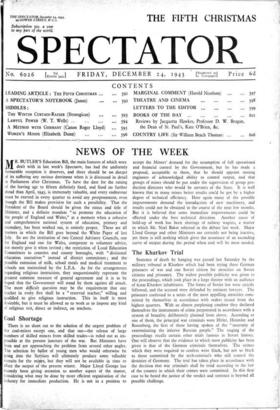NEWS OF THE WEEK
MR. BUTLER'S Education Bill, the main features of which were dealt with in last week's Spectator, has had the uniformly favourable reception it deserves, and there should be no danger of its suffering any serious detriment when it is discussed in detail in Parliament after Christmas. To have the date for the raising of the leaving age to fifteen definitely fixed, and fixed no further ahead than April, 1945, is immensely valuable, and every endeavour must be exerted in every quarter to avoid any postponement, even though the Bill makes provision for such a possibility. That the President of the Board should be given the status and title of Minister, and a definite mandate " to promote the education of the people of England and Wales," at a moment when a cohesive and comprehensive national system of education, primary and secondary, has been worked out, is entirely proper. These are all matters in which the Bill goes beyond the White Paper of last July. So are the institution of two Central Advisory Councils, one for England and one for Wales, competent to volunteer advice, not merely give it when invited ; the restriction of Local Education Committees to counties and county boroughs, with " divisional education executives" instead of district committees ; and the- possible extension of milk, school meals and medical treatment to schools not maintained by the L.E.A. As for the arrangements regarding religious instruction, they unquestionably represent the greatest common measure of general agreement and it is to be hoped that the Government will stand by them against all attack. The most difficult question may be the requirement that one teacher in every five shall be a " reserved teacher," willing and qualified to give religious instruction. This in itself is most desirable, but it must be allowed so to work as to impose any kind of religious test, direct or indirect, on teachers.






















